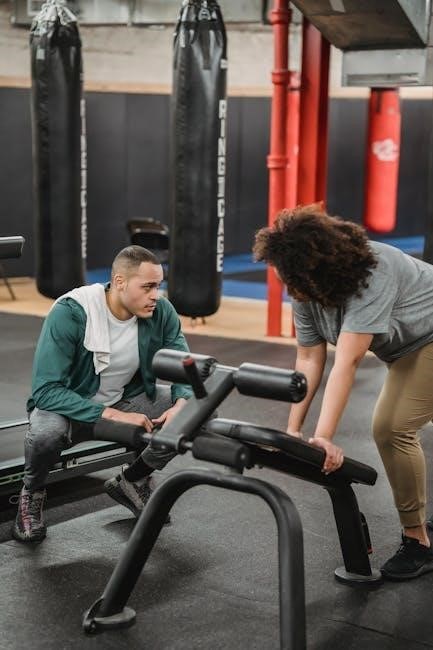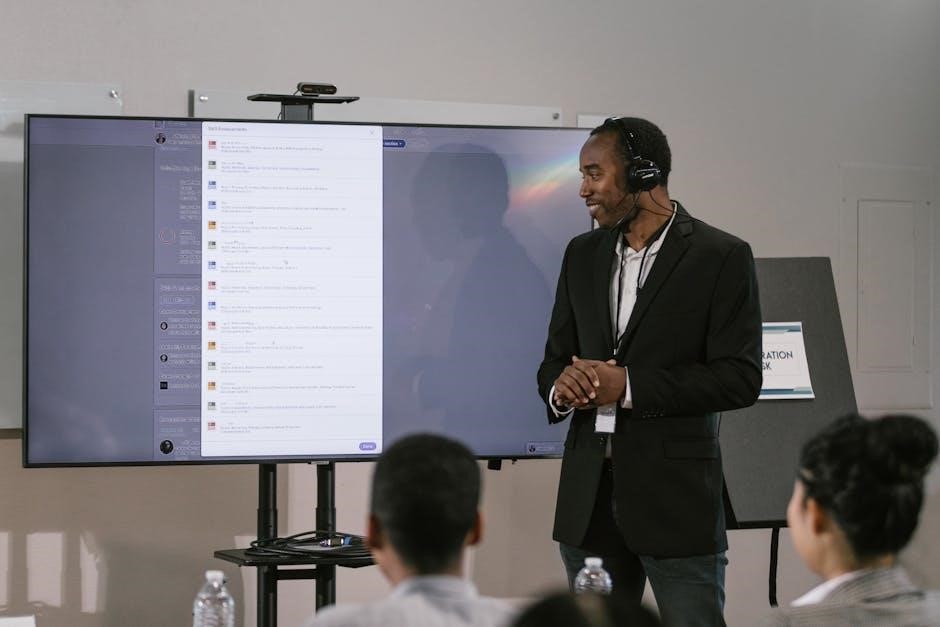
how to become an instructional coach
Instructional coaching is a professional development strategy focused on empowering educators to enhance teaching methods and student outcomes through collaborative‚ evidence-based practices and continuous improvement.
What is an Instructional Coach?

An instructional coach is an educator who works collaboratively with teachers‚ schools‚ and districts to improve teaching practices and student learning outcomes. Their primary role is to provide professional development‚ support‚ and guidance to educators‚ helping them refine their instructional strategies and integrate evidence-based practices into the classroom. Instructional coaches focus on fostering a growth mindset‚ enhancing teacher efficacy‚ and promoting continuous improvement in education. They often serve as a bridge between educational research and practical application‚ ensuring that teachers are equipped with the tools and knowledge needed to meet the diverse needs of their students. Effective instructional coaches are skilled communicators‚ active listeners‚ and adept at facilitating professional learning opportunities that align with school and district goals.
The Importance of Instructional Coaching in Education
Instructional coaching plays a pivotal role in enhancing the quality of education by supporting teachers in refining their instructional practices. By focusing on evidence-based strategies‚ coaches help educators improve student engagement‚ academic achievement‚ and overall classroom management. This collaborative approach not only strengthens teaching skills but also fosters a culture of continuous professional growth within schools. Instructional coaching bridges the gap between educational research and practical application‚ ensuring that teachers are well-equipped to meet the diverse needs of their students. Additionally‚ it promotes data-driven decision-making‚ allowing educators to tailor their methods to maximize student outcomes. The impact of instructional coaching extends beyond individual teachers‚ contributing to systemic improvements in schools and districts‚ ultimately benefiting both educators and learners alike.

Core Competencies for Instructional Coaches

Instructional coaches must excel in communication‚ knowledge of teaching strategies‚ adult learning theory‚ and leadership‚ ensuring they can effectively support educators in improving instructional practices and student success.
Communication and Interpersonal Skills

Effective communication and interpersonal skills are foundational for instructional coaches. They must actively listen to educators‚ understand their challenges‚ and communicate solutions clearly. Building trust through empathy and transparency fosters collaborative relationships. Coaches should navigate diverse personalities and conflicts with tact‚ ensuring constructive dialogue. Clear articulation of ideas and feedback is essential for guiding teachers toward improved practices. Strong interpersonal skills enable coaches to adapt their approach to meet individual needs‚ creating a supportive environment for professional growth. These abilities ensure coaches can successfully partner with educators‚ driving instructional excellence and student achievement.

Knowledge of Teaching Methods and Strategies
A strong foundation in teaching methods and strategies is vital for instructional coaches. Coaches must be well-versed in evidence-based practices‚ such as differentiated instruction‚ project-based learning‚ and technology integration‚ to support educators effectively. Understanding diverse teaching approaches enables coaches to tailor professional development to meet the unique needs of teachers and students. Familiarity with curriculum design‚ assessment techniques‚ and classroom management strategies is also essential. By staying current on best practices‚ coaches can guide teachers in implementing innovative and effective instructional techniques. This expertise allows coaches to provide actionable feedback and resources‚ helping educators enhance student engagement‚ academic performance‚ and overall learning outcomes. Continuous professional development ensures coaches remain informed about emerging educational trends and methodologies.

Understanding of Adult Learning Theory
Instructional coaches must grasp adult learning theory to effectively support educators. Adults learn differently from children‚ prioritizing relevance‚ autonomy‚ and practical application. Coaches should apply principles like self-directed learning and experiential approaches to professional development. Understanding these concepts ensures that coaches design engaging‚ meaningful experiences for teachers‚ fostering continuous improvement and enhancing their instructional skills. This knowledge allows coaches to tailor their strategies to meet the unique needs of adult learners‚ creating a collaborative and supportive environment for professional growth.
Steps to Become an Instructional Coach
Earning a degree in education‚ obtaining certification‚ and gaining teaching experience are key steps. Developing strong communication skills and knowledge of effective teaching strategies is also essential for success.
Education and Certification Requirements
To become an instructional coach‚ a bachelor’s or master’s degree in education or a related field is typically required. Many instructional coaches start as teachers‚ gaining classroom experience before transitioning into coaching roles. Certification requirements vary by state or school district‚ but many states offer specific instructional coaching certifications. These certifications often involve completing a training program‚ passing an exam‚ or earning a specialized endorsement. Some programs may also require a background in curriculum design or adult learning theory. Additionally‚ certifications like the Instructional Coaching Certification offered by organizations such as the Instructional Coaching Group are highly regarded. It’s important to check state-specific requirements and pursue certifications that align with your career goals and regional standards.
Gaining Practical Experience
Gaining practical experience is crucial for becoming an effective instructional coach. Many coaches begin their careers as classroom teachers‚ where they develop a deep understanding of teaching practices and student needs. Transitioning into coaching often involves starting with informal mentoring or peer coaching roles. Some schools offer residency programs or apprenticeships that allow aspiring coaches to work alongside experienced instructional coaches. Additionally‚ participating in professional development workshops‚ attending educational conferences‚ and engaging in collaborative planning with teachers can provide valuable hands-on experience. Co-teaching‚ observing classrooms‚ and analyzing student data are also essential practices that help build the skills needed for instructional coaching. Hands-on experience not only enhances your ability to support teachers but also strengthens your credibility as a coach.

Advanced Strategies for Instructional Coaches

Advanced strategies involve leveraging data-driven insights‚ fostering teacher collaboration‚ and implementing evidence-based practices to enhance instructional effectiveness and student learning outcomes continuously.

Using Data-Driven Instructional Strategies
Instructional coaches effectively use data-driven strategies to assess teaching methods and student performance. By analyzing metrics such as test scores‚ classroom observations‚ and feedback‚ coaches identify areas for improvement. They employ tools like formative assessments and learning analytics to track progress and tailor interventions. Data-driven approaches enable coaches to provide targeted support‚ ensuring teachers adopt evidence-based practices. This collaborative process fosters a culture of continuous improvement‚ helping educators refine their techniques and enhance student outcomes. Coaches also use data to communicate effectively with stakeholders‚ demonstrating the impact of their work. By leveraging data‚ instructional coaches empower teachers to make informed decisions‚ leading to more effective and personalized instruction.
Providing Effective Feedback and Coaching
Instructional coaches play a pivotal role in providing constructive feedback and coaching to educators. Effective feedback is specific‚ timely‚ and actionable‚ focusing on observable behaviors and their impact on student learning. Coaches use strategies such as observation‚ modeling‚ and reflective questioning to guide teachers in improving their practices. They foster a collaborative environment‚ encouraging teachers to reflect on their instruction and set professional growth goals. Coaches also tailor their support to meet individual needs‚ offering resources and strategies aligned with teacher goals. By fostering a growth mindset and building trust‚ instructional coaches empower educators to refine their skills and enhance classroom outcomes. Effective feedback and coaching are essential for sustained professional development and improved student achievement.